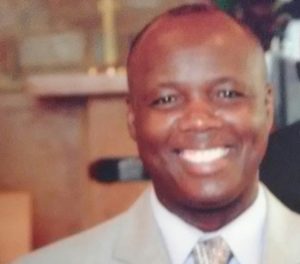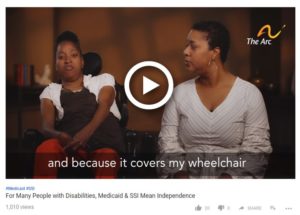 Tell us about your chapter’s school-to-work transition initiative!
Tell us about your chapter’s school-to-work transition initiative!
The Arc Prince George’s County provides transition and school to work services that include Project SEARCH, Ready@21 and our Youth Job Prep programs.
Project SEARCH: Our program is one of only two sites on an air force base. Located at Joint Base Andrews, our program supports 7 to 10 students from Prince George’s County Public School System who experience a variety of work settings through three 10-week rotations throughout the school year. We partnered with Department of Rehabilitation Services, Joint Base Andrews, Maryland Developmental Disability Administration and Prince George’s County Public Schools. We had our first graduation in May 2018 and 75% of the students have obtained employment – one on base.
Ready@21 is a program that is preparing youth and their families for the transition process. Educational workshops are offered for parents and caregivers as well as the students on a monthly basis. The program for the students includes work readiness and skill building that covers appropriate work behavior, resume/portfolio development, job search, and interviewing.
Youth Prep Program provides supports to youth between the ages of 16-24 that have exited school and are not eligible for waiver funding. The program provides six months of work readiness and skill building training. It is open entry programs meaning that student can enter at any point and the supports are individualized and person-centered – based on functioning levels, interest, and employment and career goals.
Once a youth is ready for placement, our job developers work with them to obtain employment and employment specialist provide on the job coaching supports that diminishes over time and transitions to drop-in support. Once a youth is on the job for 90 consecutive days we discharge them but continue follow-up for one year to measure progress.
How is this initiative unique from other school-to-work initiatives?
Our school to work programs was developed in response to 1) the youth employment rate for individuals with disabilities and the request for services for youth that exited school with a diploma and were not eligible for support funding until they were 21, 2) the need for job training and transition readiness as students prepare to move from entitlement services to eligibility supports and the need to provide students with transferable work experiences/exposure and relevant social skill development, 3) increasing future opportunities for competitive employment while in school or after exiting school, and 4) the need for real world, hands-on training through a unique opportunity to explore a number of different career paths. Our program is customized to fit the needs and preferences of those participating and is person-centered and geared toward supporting at the pace and needs of the youth/young adults participating in the programs.
Our programs are flexible and we are willing and eager to work with any employer that wants to partner with us to offer a wide variety of work exposure (e.g. shadowing) and experiences. In order to help youth make informed choices, we conduct a career assessment with youth that includes, but is not limited to, interest inventories and informal written and electronic vocational assessments.
Why do you think building employment skills while students are still in school is important?
It is clear that youth and young adults need exposure to a range of work-based experiences such as job visits, community service, job shadowing, and paid and unpaid internships. We found it helpful to offer opportunities for students to integrate into the workforce before or shortly after exiting school. This results in a faster and seamless transition from school to stable employment and the adult life. Our program also helps students/young adults have a better understanding and exposure to work opportunities that guide them toward what future careers they wish to pursue.
The program is very beneficial to young adult and employers. The students learn how to work in the workforce and how to be a successful contributing member of their community. The businesses benefit by having a lower cost in recruitment and training for new employees, more diversity in the work place, and a reliable dedicated workforce with employment supports to decrease likelihood of lower turnover.
How do you prepare your staff to take on a new project like this, and to be prepared to support these students? How does it differ working with students on a school-to-work transition compared to long-term adult placement support?
We offer our staff the opportunity to participate in activities and trainings with a focus on youth and youth employment services. Our placement team has all been certified through the national ACRE certification program. The staff developed skills in discovery, customization, and placement in order to provide person-centered supports.
Supporting youth is a little different than our adult population as they have a very limited work history and we have the opportunity to assist them to develop appropriate work-related and social skills before they develop some of the bad habits that prevent them from obtaining and/or retaining employment the leads toward careers in the future. Also, supports may be short-term and can be phased out more quickly. Natural supports are more easily developed in the business environment.
How do you anticipate this project benefitting your chapter’s sustainability and your ties to the community? What does success for this program look like to you?
We are educating the community and local businesses about persons with disabilities and the skills they may bring. In addition, our chapter can be the go-to organization for qualified trained candidates to meet employers’ employment needs. It also opens additional opportunities to seek grants and other funding options for youth services, employment training, and placement. As a result of offering youth and young adult school-to-work services, we have increased service options for families at an earlier phase in their loved one’s life that will guide them to a smoother transition in the adult world of work. The addition to these services has also resulted in an increase in our census and funding as when they are eligible for adult services they are more likely to select The Arc for long-term supports and services.
We see success of our youth/young adults that we support in our school to work programs to obtain good work ethics and skills that will assist them on obtaining and retaining employment and develop goals that lead to future careers. We also will work to increase the number of business partnerships to increase the variety of opportunities for work experiences and potential employers for the youth in our school to work and transition programs. We would like the youth to be prepared to exit school with all the tools they need to be successful on a job and the ultimate would be to exit with a job of their choosing that matches their desires, interest and will lead to a career. It is very common for staff, employers and persons with disabilities to underestimate their skills. It may take more time and effort for everyone involved but it can be accomplished. There is always a leading contingent, and for us that includes partner organizations like Giant Food, TJ Maxx, University of Maryland, Safeway, FCC, Thompson Creek and many more.
How is this transferable to other chapters and organizations? Do you have any advice for other chapters looking to implement similar initiatives?
Employment is all about relationship building. In some sense, we are a staffing and sales organization. I would suggest that chapters develop a good working partnership with your local school systems and vocational rehabilitation programs. Also become active in your chamber of commerce or other related business groups to connect with potential business partners. Another important factor is to have good job developers and support staff that can provide person-centered job matching, coaching, and retention supports. Moreover, they must be good at business development and community outreach to many employers to share the case for hiring people with disabilities.
Don’t forget parent engagement. Another important component to the success of any youth or school-to-work program involves including the parents and caregivers as the youth/young adults are going to need their support as well. Parents also need education in the transition process and the earlier, the better as the transition is not only a challenge for the youth but the parents as well. Parents play an important role in providing invaluable career guidance and support to their loved ones. They can help prepare their loved ones for adult work by providing appropriate adult models to follow, assisting to connect with contacts and networks in the community.



 The start of a new school year can bring both excitement and anxiety for students and parents, especially for families of students receiving special education supports. Students with disabilities who struggle with change may need extra help making the transition to a new school or teacher.
The start of a new school year can bring both excitement and anxiety for students and parents, especially for families of students receiving special education supports. Students with disabilities who struggle with change may need extra help making the transition to a new school or teacher. Tell us about your chapter’s school-to-work transition initiative!
Tell us about your chapter’s school-to-work transition initiative!
 As a first time attendee and speaker at the NCE SLI conference, I was extremely impressed with how well organized the entire event was, in particular, the concise and very informative presentations of each speaker as well as the ability to access each sessions notes using the NCE website. Furthermore, the breakout session provided greater opportunities for interaction with the audience who were more apt to engage on topics of interest and relevance to their area of service.
As a first time attendee and speaker at the NCE SLI conference, I was extremely impressed with how well organized the entire event was, in particular, the concise and very informative presentations of each speaker as well as the ability to access each sessions notes using the NCE website. Furthermore, the breakout session provided greater opportunities for interaction with the audience who were more apt to engage on topics of interest and relevance to their area of service. Meet Samera! Samera is 27 years old, a poet, and likes to read books, go to concerts, and spend time with her friends and family. She lives in a home in her community, supported by The Arc of Baltimore.
Meet Samera! Samera is 27 years old, a poet, and likes to read books, go to concerts, and spend time with her friends and family. She lives in a home in her community, supported by The Arc of Baltimore.






